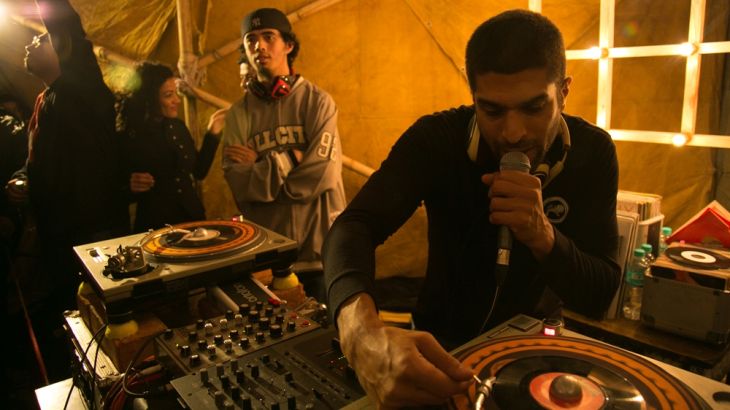
India’s Reggae Resistance: Defending Dissent Under Modi
An Indian reggae musician builds a Jamaican-style sound system to energise a wave of protests defending free speech.
Indian musician Taru Dalmia is convinced his reggae sounds can play a role in political activism, and decides it’s time to act when a wave of protests erupts at universities across India.
To take his music into the hearts of rallies and communities, he raises money to build a giant sound system and hits the road.
Keep reading
list of 4 itemsThousands protest against Israel’s participation in Eurovision final
Boos for Israel’s entry at Eurovision rehearsal
Dystopia of Seoul: AI re-composes Vivaldi concerto using climate data
Taru hopes his hand-built stack of speakers can support protesters alleging that free speech is being suppressed under Narendra Modi’s Hindu nationalist government.
But he’s uncertain how local artists and activists will react. Will they embrace his Jamaica-inspired music, or see him as a naive outsider out of touch with the country’s politics?
![Taru Dalmia prepares his sound system for a show in Moirang, Manipur on March 16, 2017 [BFR Sound System/Al Jazeera]](/wp-content/uploads/2017/05/1e3cb19827854a8ea445ba31473c9704_18.jpeg)
FILMMAKER’S VIEW
By Vikram Singh
Under the government of Narendra Modi, a shift towards right-wing Hindu nationalism has taken place in India in the past three years, apparent in government policies and public discourse. One of the major consequences of this has been a growing concern that free speech is being curtailed – and this is something that is of personal concern to me as a journalist and filmmaker.
I wanted to make a film that explored the issue through the eyes of someone who is engaging with it in their work, ideally an artist. I started scouting around for artists, writers and musicians who might be producing work in response to the growing right-wing movement in the country.
Taru was already on my radar because his band, the Ska Vengers, had produced a video after Modi’s election called A Message to You, Modi, which was really direct and bold. The lyrics include “Stop your fooling around / Messing up our future / Time to straighten right out / You should have wound up in jail.”
He had also been involved in a project called World Sound Power, which tried to meld Indian folk resistance music with Jamaican sounds, with lyrics focusing on caste violence, state abuse of power and crony capitalism.
When I heard about Taru’s plans to build a sound system and tour protest sites with it, I immediately saw the potential for a really compelling story, both visually and in terms of narrative.
The first time we spoke, it was apparent that this is something he’d been dreaming of doing his whole life, that it meant a lot to him and he was extremely motivated. It’s been fascinating to see his idea grow into the reality of the sound system, and from that into a vibrant community of people who come for the shows, both to contribute musically and also just to dance.
I have to admit to being obsessed with sound and speakers myself. The chance to film this huge rig being built, then set up and listening to these rare reggae records playing from it has been a real treat. I also love to film people dancing, and this journey gave us the chance to witness some truly spectacular moments, people just letting go and dancing with complete freedom. I hope people watching the film get a sense of how special that vibe was.